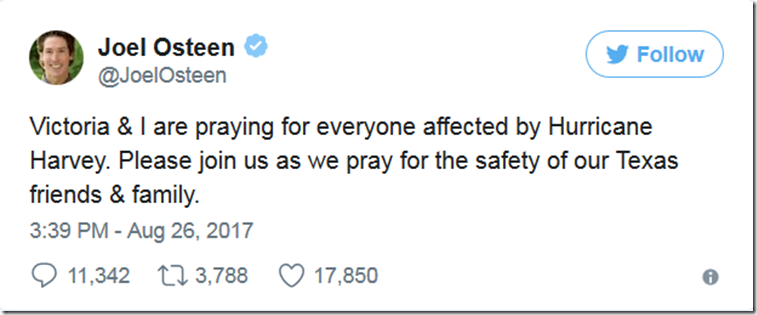Joel Osteen’s Hurricane Response: Days Late And Dollars Short
It’s an indelible image: the wealthy televangelist who fleeces parishioners with an inspiring message while emptying their pockets.
Anyone who remembers Jimmy Swaggart tearfully confessing to his sins, Jim Bakker’s scandalous affair, or Ted Haggard’s anti-gay moralizing while hiring a male prostitute, has seen pious religious leaders who weren’t everything they pretended to be.
Fairly or not, critics of Joel Osteen—the Houston-based senior pastor of Lakewood Church—accused him of matching that archetype earlier this week for his apparent reluctance to immediately house victims of Hurricane Harvey. (He did say early on that his church would be available if shelters reached capacity, but not before.)
His giant mega-church—which was once home to the NBA’s Houston Rockets—seats 16,800 people. But rather than offering his church as a place of refuge to a city in need, Osteen tweeted this:
That seems innocuous enough, but his tweet got “ratio’d,” meaning that it generated more replies than retweets, a relatively rarity on Twitter. And as usual when a tweet is ratio’d, most of those replies were scathing, noting the apparent hypocrisy of a man of God—whose net worth is reportedly north of $56,000,000—failing to step up and offer more than prayers alone when his hometown needed him so desperately.
Those accusations of hypocrisy intensified after Lakewood stated on Sunday that the church had “severe flooding,” a claim that came into question when photos showed little water near the church or in that part of the city, which didn’t suffer from the worst of Houston’s flooding.
Some of the initial Twitter commentary struck me as unfair—it wasn’t clear that the first people to criticize him had made any effort to contact him to learn whether he was doing any work behind the scenes to help. But within hours, news organizations tried—and failed—to reach him, noting that calls to his office went unreturned.
This morning, Osteen granted several television interviews to give his side of the story. Among other points he made: The City of Houston hadn’t asked him to set up a shelter; there was another shelter four miles away with a 10,000-person capacity that he never imagined would fill; Lakewood was close to flooding itself; and the logistical and staffing challenges of opening Lakewood immediately would have been enormous and couldn’t have been done immediately.
If you’re cynical about televangelists, Osteen’s tone in the Today Show interview above probably struck you as smarmy and self-satisfied. If you’re one of the millions of people who watch his sermons and read his books, you probably viewed him as sincere.
Regardless of your perception of his tone, what’s undeniable is that he’s on the defensive as a result of failing to respond sooner and, arguably, more selflessly. There’s a simple formula in many crisis responses that looks something like this:
Right response at the right time = Best chance of getting full credit
Right response at the wrong time = Partial credit (at best)
Wrong response at the wrong time = No credit
In this case, Osteen is somewhere between the second and third responses. Much of what he said in the Today Show interview struck me as plausible—I can understand why opening a building of that size would require many staffers, many of whom are dealing with their own challenges during the Hurricane and would have been unable to get to work.
But what strikes me most is that Osteen apparently hadn’t had serious discussions with the City of Houston about what role the church could play during a major disaster. Lakewood could have had an established role and put into place procedures that would have allowed the mega-church to serve its community in a moment of crisis from the start.
His claims that no one could have anticipated a crisis of this scale aren’t credible; Houston has long been at risk of a major flood, as many reporters have noted. Any communications pro drafting a crisis response plan would have had “hurricane” at the top of their list.
Beyond being a communications failure for Osteen, it’s also a missed opportunity. He had the chance to be the brand by either offering Lakewood as a refuge or doing something else substantive to help. If he had plans to do so, his failure to communicate his intent moments after (or even before) criticism began to mount allowed an incorrect narrative to take hold.
Offer the right response at the right time! The Media Training Bible offers you guidance for a better crisis response. Click here for more.




My understanding (from my niece who lives in Houston) was that the mayor told the residents not to evacuate. They thought the storm was going west and would avoid Houston. Clearly, no one was anticipating the flooding they received. How was anyone to know that the area around Lakewood was or was not flooded? I don’t blame Joel at all for not acting right away.
Hi Sherry,
Thank you for your comment and for reading the blog.
I agree with you that there’s no reasonable way Pastor Osteen could have perfectly anticipated the path of the storm. Here’s what I would say from personal experience, though: any crisis communications professional would and could have anticipated a natural disaster occurring in the region at some point, and it was Lakewood’s responsibility to solicit and develop a well-conceived crisis management plan for their church. The fact that Mr. Osteen is presiding over a church places unique burdens on them from a public relations point of view — as you saw play out here — and the fact that he was seemingly caught flat-footed makes clear to crisis managers that something went wrong in this case.
Be well, and thanks again.
Brad
Hello, Brad! Terrific piece, as always. But I’d suggest it’s not “[t]he fact that Mr. Osteen is presiding over a church” [which] places unique burdens on them from a public relations point of view” – it’s the fact that he presides over such an incredibly large one, is on television, and is so wealthy. Certainly rank-and-file churches in a natural disaster zone aren’t held to the same scrutiny or standards. The size, scope, net worth, and influence of his church would be the key difference requiring a more thoroughly prepared public relations response. That’s my thought, at any rate.
Thank you again!
Hi Lisa,
Thanks so much for your kind words. And in response to your point, I have only two words: you’re right.
Thanks for reading!
Brad